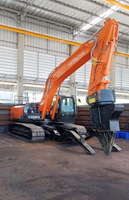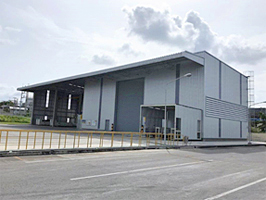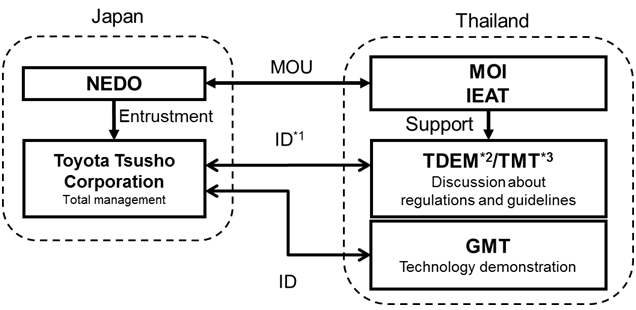Demonstration Starts on a System for Recycling End-of-Life Vehicles in Thailand
―Introduction of High-Efficiency Recycling System Using Heavy Machinery for Dismantling Vehicles―
November 22, 2019
New Energy and Industrial Technology Development Organization (NEDO)
The New Energy and Industrial Technology Development Organization (NEDO) has started demonstrative operation of an end-of-life vehicle (ELV) recycling system using heavy machinery for dismantling vehicles at the Green Metals (Thailand) Co., Ltd. (GMT) factory in Pinthong, Thailand. This demonstration project is being carried out based on a memorandum of understanding (MOU) concluded on February 8, 2019, among NEDO, the Ministry of Industry of Thailand (MOI), and the Industrial Estate Authority of Thailand (IEAT).
Heavy machinery for dismantling vehicles was introduced to Thailand to systematize and streamline the ELV dismantling process. The system is expected to dismantle 20 vehicles per day. NEDO will also provide advice on developing laws and regulations related to the proper handling of ELVs.
In addition, valuable resources that cannot be processed in Thailand will be recycled in Japan, which will lead to the establishment of an international resource circulation system. The project ultimately aims to create a model recycling system for Thailand and other Asian countries.
-
 Figure 1: Vehicle dismantling machine
Figure 1: Vehicle dismantling machine
introduced to GMT -
 Figure 2: GMT’s ELV dismantling factory
Figure 2: GMT’s ELV dismantling factory
1.Background
As vehicle sales are growing in Thailand, the number of end-of-life vehicles (ELVs) is expected to increase in the future. However, Thailand does not have a system that specializes in handling chlorofluorocarbons, liquid waste, and other hazardous materials relating to dismantling ELVs. It has not enacted any laws or regulations related to proper handling of ELVs or a relevant licensing system. At the moment, ELVs are dismantled mainly through labor-intensive manual work, and as the dismantling process is not well organized, resources are not efficiently recovered from ELVs. It is also anticipated that the current capacity for dismantling vehicles will not be sufficient to process the increasing number of ELVs in the future.
In response to this situation, NEDO, the Ministry of Industry of Thailand (MOI), and the Industrial Estate Authority of Thailand (IEAT) reached an agreement on carrying out a demonstration project for recycling ELVs in Bangkok and the surrounding area. A memorandum of understanding (MOU) was concluded on February 8, 2019. Project work has been entrusted to Toyota Tsusho Corporation. Thailand’s first heavy machinery for dismantling vehicles was introduced to the Green Metals (Thailand) Co., Ltd. (GMT) factory in Pinthong, where an environmentally-friendly ELV recycling system has started demonstrative operation.
2.Project Outline
Currently, ELVs are dismantled mainly through labor-intensive work, and only about one vehicle can be dismantled at the factory per day. During the project, dismantling work will include the recovery of chlorofluorocarbons, oil, and other liquid waste. It will also include an environmentally-friendly dismantling process with a traceability function that will enable the tracking of resource recovery and treatment. In addition, heavy machinery has been introduced to systematize and streamline the dismantling process, so that 20 vehicles can be dismantled per day. The project is expected to demonstrate a system that can alleviate the environmental burden and efficiently recover valuable metals and other resources from ELVs with the aim of contributing to appropriate waste treatment in Thailand. Furthermore, substrates, catalysts, and other useful materials that cannot be treated in Thailand will be exported to Japan for recycling, which will lead to the establishment of an international resource circulation system. The project ultimately aims to create a model recycling system for Thailand and other Asian countries.
In the meantime, NEDO will provide advice on developing laws and regulations related to the proper handling of ELVs suitable for Thailand in cooperation with Japan’s Ministry of Economy, Trade and Industry based on Japan’s Automobile Recycling Law.
Project participants and location
- Entrusted company: Toyota Tsusho Corporation
- Site company: GMT
- Demonstration site: GMT's factory in Pinthong, Thailand
-
 Figure 3: Project organization chart
Figure 3: Project organization chart
Notes:
- *1 Implementation document
- *2 Toyota Daihatsu Engineering & Manufacturing Co., Ltd.: Toyota Motor Corporation’s subsidiary company that acts as regional headquarters in Asia
- *3 Toyota Motor Thailand Co., Ltd.: Toyota Motor Corporation’s subsidiary company in Thailand
3. For more information, please contact:
Environment Department, NEDO
Persons in charge: Fujie, Nakajima, Yamane, Abe
Tel: +81-44-520-5251



